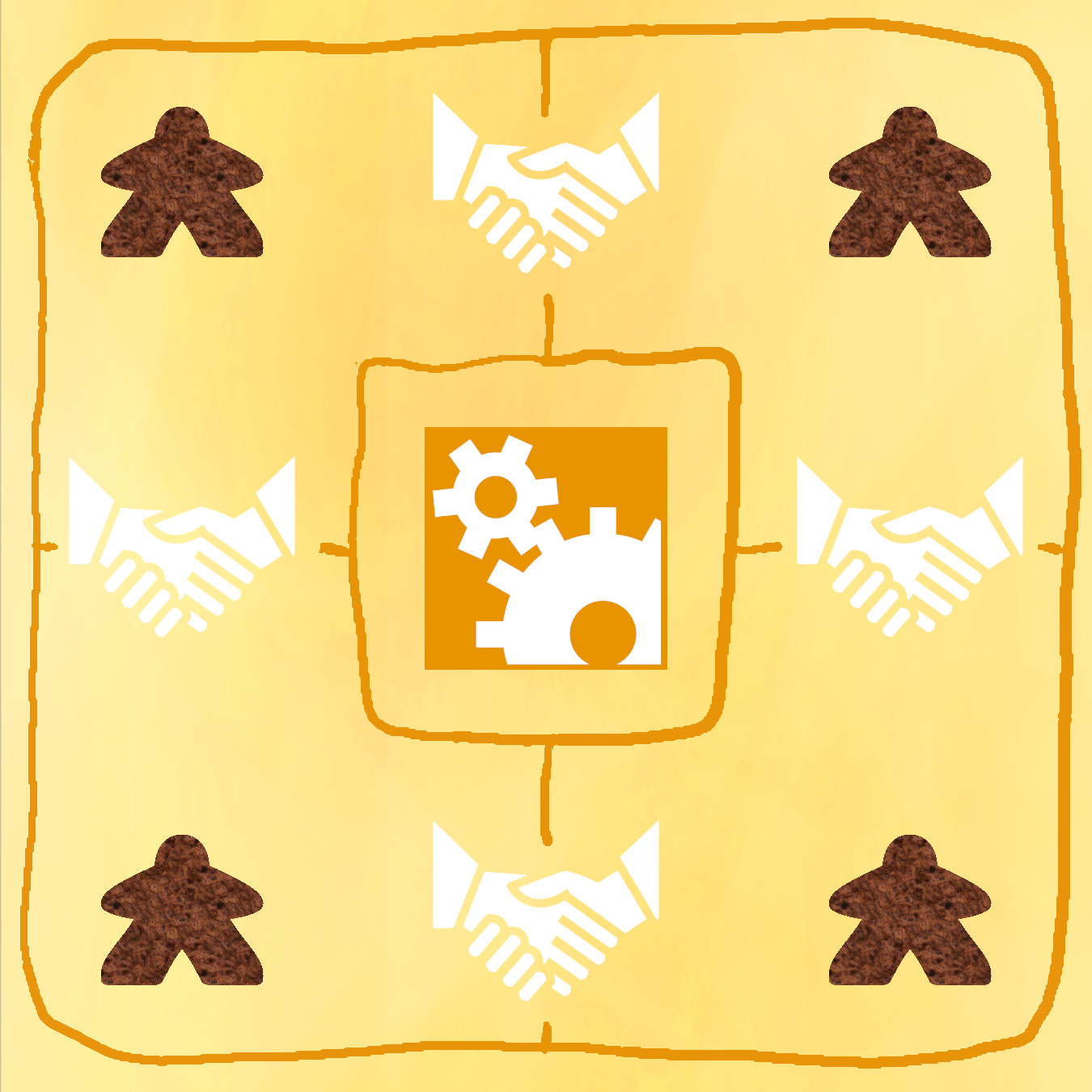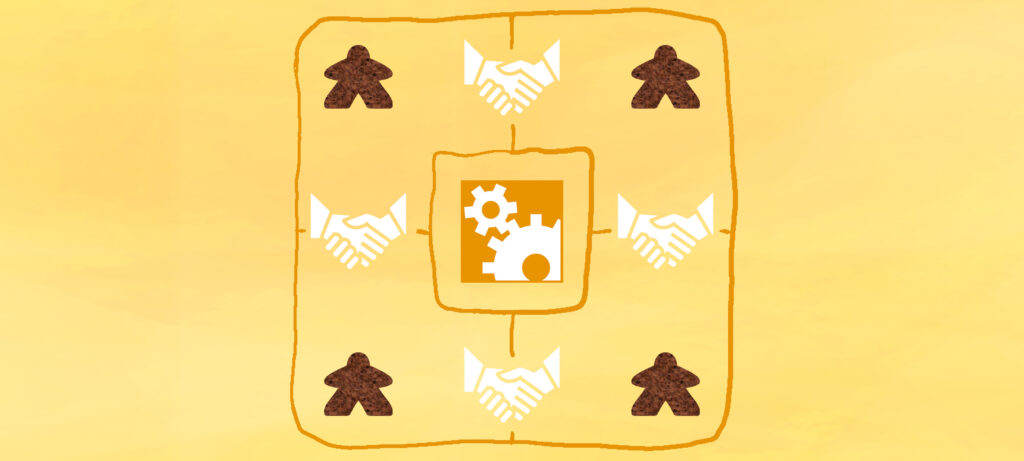
When getting to know new people, I often enjoy asking about others’ favorite sports and hearing some of their stories of experiences playing on teams or watching them compete. Once when having a dinner conversation with a new friend I asked about what sports he had played, and he told me that his high school sport was band.
Hearing that made me laugh, but he made some good points while defending his position. I have always enjoyed playing sports, and one commonality between most sports, even band, is the need for cooperation. Sometimes everyone tries to make it through together and sometimes two or more teams compete, but in either case people work together and help each other accomplish a goal.
Many board and card games invite or require cooperation as well, and can offer great opportunities for players to build relationships, work together, and solve problems as a team. Please take a minute to look over some of my thoughts on cooperation below, and let me know your perspective on cooperation in board games!

Overview of Cooperation
Games with cooperation are great for groups that are a little less competitive or just want to enjoy a challenge together. Depending on the type of cooperation, games might have varying degrees of conflict and working together.
We can define cooperation games as any game that encourages or requires players to work together to reach goals or win the game. This is a fairly broad definition, but can be useful when thinking about how we might add cooperation in the games that we design. Finding ways to help players work together to achieve goals can often make games unifying, uplifting, and enjoyable in a way that no other game mechanic can do.
Cooperation is a fantastic way to increase player interaction in games, and many games can be improved as designers and players alike look for ways to make aspects of a game or even a whole game a team effort. See below for some important distinctions to consider when designing or looking for cooperation in a game!
Important Considerations with Cooperation
Cooperation can take any of several different forms, and sometimes multiple forms at once! Here are the main ones. Let me know of other types of cooperation you have seen in games!
- Full Cooperation: Full cooperation describes any game in which all players help each other and win or lose together. This includes games like Forbidden Island, Forbidden Desert, Pandemic, Wildcraft!, Castle Panic, and Meteor.
- Team Cooperation: Team cooperation describes any game in which teams are formed that cooperate with one another, but work against other teams. This includes games like Saboteur, The Resistance, Falconry, Codenames, Rook, and One Night Ultimate Werewolf.
- Forced Cooperation: Forced cooperation describes any game where players cannot win without cooperating, but each player competes with the others and wins individually. In some cases players must cooperate with one another or all players on a team or in the game lose together, and in other cases players only jeopardize their own personal victory if they do not cooperate. Examples of forced cooperation might include Between Two Cities, Between Two Castles of Mad King Ludwig, Pit, and Saboteur.
- Incidental Cooperation: Partial cooperation describes any game in which players are benefitted by cooperating with one another, but cooperation is not required. This is probably the most common form of cooperation in games, as it can naturally occur whether or not it was planned into the game. Partial cooperation can include anything from an alliance in Chess 4, to shared ownership in a train company in Chicago Express, to trading resources in Settlers of Catan, as well as other variations in many other games.
When designing a game with cooperation, we need to decide what level of cooperation we want to include in the game (see above), and then find the most appropriate way to include it while keeping players engaged. Below are tips for designing a game with each of the four levels of cooperation:
- Full Cooperation: Explore thematic goals for all players to accomplish and overcome together. Make sure to include ways for every player to be involved in both strategizing and acting, whether through hidden information and moves, or a sincere need for every player to contribute to the game’s success.
- Team Cooperation: Often limiting either team or inter-team communication can help all team members to remain involved. Having separate and conflicting goals for each team can add tension while retaining the cooperative aspect.
- Forced Cooperation: To include forced cooperation, creators often must find a way to give each player access to information or resources that one or more other players need, which facilitates trade and exchange. Another way to do this is to add a shared threat embedded in the game itself (maybe even a dummy or AI player) that all players need to work together to fight while furthering their own objectives.
- Incidental Cooperation: This kind of cooperation often doesn’t even need to be planned in, but designers might add goals that are much more likely to be completed by two or more players working together and give shared points, or plan in other aspects of the game that give benefits for cooperation.
What other tips or considerations do you have for designers when including cooperation as a mechanism in their games? Please share below!
Cautions and Tips for Using Cooperation
Including a cooperative aspect can be a great thing for tabletop games, but in doing so we need to find ways to keep all of players involved. Forbidden Island and Forbidden Desert, for example, are fantastic games that I have enjoyed playing with family and friends. However, with certain groups, some players solve all the problems while other quieter players might feel somewhat left out and disengaged.
Much of the responsibility for including all players falls on those actually playing the game, but as designers we can certainly watch for and try to plan in ways to avoid problems like this. Meteor attempts to solve this problem by requiring players to usually play in silence until a certain technology is unlocked. What other ways have you seen this problem resolved?
Another common problem is that cooperation games rely too much on luck. I remember feeling this way when our family played Wildcraft!, though we still had fun playing it, and part of its purpose is educational. The responsibility for this also falls on us as designers to find ways to intelligently make games consistently challenging with a minimum of luck added for variability. Designers who have created solo variants of games might often have good insight on this, as technically every solo game could be considered fully cooperative. 🙂 What are ways you have solved this problem or seen it solved well?
What are some interesting ways you have seen cooperation be used as a part of a game? How else can cooperation be used in strategic games? Please comment below with your thoughts!
Cooperation games include any game that encourages or requires players to work together to reach goals or win the game. Finding ways to help players work together to achieve goals can make games unifying, uplifting, and enjoyable in a way that no other game mechanic can do.

Please note: Through the Amazon Associates program, we earn from any qualifying purchases.
Other Tabletop Game Mechanics to Explore
- Action Drafting Mechanic
- Alliances Mechanic
- Auctioning Mechanic (Part 1/2)
- Auctioning Mechanic (Part 2/2)
- Bluffing Mechanic
- Board Game Mechanics: An Overview
- Component Drafting Mechanic
- Cooperation Mechanic
- Dice Rolling Mechanic
- Direct Conflict Mechanic
- Elimination Mechanic
- Engine Building Mechanic
- Finance Mechanic
- Irregular Turn Order Mechanic
- Memory Mechanic
- Negotiation Mechanic
- Random Selection
- Social Deduction Mechanic
- Tile Placement Mechanic
- Unique Abilities Mechanic
- Worker Placement Mechanic
Are there other game mechanics or topics that you would like to see explored further? Please comment below with any requests!

[…] Cooperation Mechanic […]
[…] Source: Cooperation Mechanic – Circle J Games […]